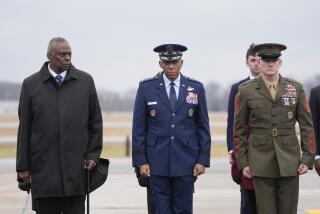Iraq Says POWs Same as Criminals : Prisoners: American fliers attacked civilians, Radio Baghdad says. It pledges to punish them as killers.
- Share via
NICOSIA, Cyprus — Iraq said Friday that captured allied fliers will be treated as common criminals, and not as prisoners of war, for allegedly carrying out indiscriminate attacks on civilians, including machine-gunning people on the streets of residential neighborhoods.
In a Radio Baghdad broadcast monitored here, Iraq charged that “the U.S., British, French and Italian pilots . . . have deliberately bombarded purely residential districts and civilian installations. . . . They have killed very large numbers of women, children and old people in extreme cold blood.”
These attacks, the radio said, include “machine guns to kill pedestrians in streets and alleys.”
Although the official radio clearly was intensifying its effort to convince the world that the U.S.-led coalition seeking to drive Iraq from occupied Kuwait is massacring innocent civilians, no figures or examples beyond the stated claims were given.
In previous broadcasts, amid all its charges of indiscriminate attacks on civilians, Iraq reported that 345 civilians have been killed and more than 450 wounded.
The allies say they have flown more than 35,000 missions, of which more than half were combat sorties. They have repeatedly stressed that their pilots are under orders to make every effort to avoid hitting civilians and non-military buildings but concede that some civilian casualties are almost inevitable.
But those protestations are brushed aside by Iraq.
“The behavior of those pilots is very far away from the honor and moralities of the military code,” the Radio Baghdad broadcast stated. “It is the behavior of ordinary criminals like that seen in American and European films. Therefore, they should be dealt with on this basis. In other words, they should be dealt with on the basis of their being killers of defenseless children, women and old people, not as soldiers waging a war against other soldiers.”
Until now, Iraq has not disavowed the Geneva Convention governing captured enemy service personnel, although it has disregarded its major provisions dealing with identification, treatment and internment.
But in charging that the allied fliers are common criminals, Radio Baghdad seemed to be responding to American threats to prosecute Iraqi President Saddam Hussein and other ranking Iraqi officials as war criminals for, among other things, mistreating allied POWs.
In fact, Radio Baghdad responded in kind to Bush, calling him, British Prime Minister John Major, French President Francois Mitterrand and King Fahd of Saudi Arabia “war criminals.”
“They should know that they will not be pardoned, but that they will be chased personally and that every one of them will receive the punishment he deserves,” the broadcast said.
The broadcast gave no indication how Iraq would punish prisoners treated as criminals. So far, captured allied personnel have been paraded in public, shown on television and held at strategic locations, all violations of the Geneva agreement.
Allied officials also charge the Iraqis with physically and psychologically abusing the prisoners, disregarding their obligation under the Geneva Convention to remove them from harm’s way. Iraq itself has said at least one captive was killed when allied pilots attacked a government ministry building in Baghdad.
In Geneva, officials of the International Committee of the Red Cross said Friday that the Iraqis have not responded to repeated requests to visit and interview the allied prisoners of war. The Swiss-based organization is mandated by the 1949 Geneva Convention with monitoring and reporting on treatment of prisoners of war.
Peter Fuchs, head of the Red Cross task force on the Gulf, said appeals have been made inside Iraq, where the organization has had four representatives since before the start of the war, as well as at many Iraqi diplomatic missions around the world.
“There has been no official answer to this date,” he said.
However, he said he has been encouraged by a reported interview in Amman, Jordan, with a representative of the Iraqi Red Crescent Society who said visits to prisoners would soon be permitted.
Fuchs reported the arrival on Friday of four more Swiss Red Cross delegates in Baghdad, bringing the total to eight.
However, he said knowledge of what is happening with the Red Cross efforts in the Iraqi capital is limited because of a complete breakdown in telephone and radio communications that occurred after U.S. fighter-bombers destroyed a communications tower there.
As a result, the Red Cross delegates have had to hand-carry messages across the war-zone to the Iranian border, where their news is relayed to Red Cross headquarters in Geneva. Red Cross and Western diplomatic sources there said the coalition military forces are notified each time a Red Cross messenger attempts the dangerous journey.
About the situation on the other side of the front, Angelo Gnadinger, chief Red Cross representative for the Middle East, said Friday that Red Cross delegates have conducted private interviews with 114 Iraqi prisoners of war, two of whom were in Britain after being labeled POWs by the British government. He said the Red Cross had also interviewed 61 Iraqi civilians interned by the British government.
Although Iraq is a signatory of the Aug. 12, 1949, Geneva Convention Relative to the Treatment of Prisoners of War, it has refused to comply with the key section of the document that grants the Red Cross the right to “go to all places where prisoners of war may be. . . .”
The ICRC is also mandated with the responsibility of conducting interviews with the prisoners, without witnesses, and reporting on the conditions they find to both the detaining country and the country of nationality of the prisoner.
In contrast, Red Cross officials said they were satisfied with the compliance of the allied countries with the terms of the convention.
“There has been a high level of interest on that side,” said Fuchs. “So far I think we have been satisfied with the notification.”
Freed reported from Nicosia, and Tempest reported from Geneva.
More to Read
Sign up for Essential California
The most important California stories and recommendations in your inbox every morning.
You may occasionally receive promotional content from the Los Angeles Times.










